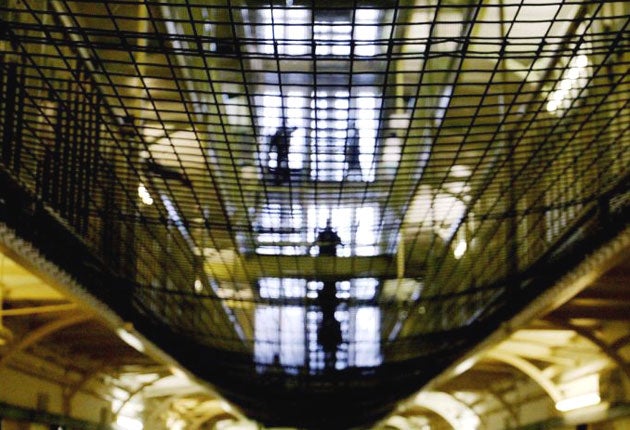Former prison governor calls for 12 new 'super-prisons' to replace old jails

Your support helps us to tell the story
From reproductive rights to climate change to Big Tech, The Independent is on the ground when the story is developing. Whether it's investigating the financials of Elon Musk's pro-Trump PAC or producing our latest documentary, 'The A Word', which shines a light on the American women fighting for reproductive rights, we know how important it is to parse out the facts from the messaging.
At such a critical moment in US history, we need reporters on the ground. Your donation allows us to keep sending journalists to speak to both sides of the story.
The Independent is trusted by Americans across the entire political spectrum. And unlike many other quality news outlets, we choose not to lock Americans out of our reporting and analysis with paywalls. We believe quality journalism should be available to everyone, paid for by those who can afford it.
Your support makes all the difference.More than 30 “run-down and poorly-located” jails should be shut and replaced with super-prisons holding up to 3,000 inmates, a former prison governor and deputy director at the Ministry of Justice (MoJ) has said.
In a report for think-tank Policy Exchange, Kevin Lockyer said the MoJ could meet its entire 2015/16 spending commitments by swapping old jails for 10 to 12 new plus-size prisons.
The new prisons would be "materially different" from Labour's 2007 plans for Titan prisons, Mr Lockyer said, and would have a campus-style design centred around a shared-service hub.
In operational costs alone, Mr Lockyer claims the plan could save more than £600 million a year on completion - 20% of the prison budget and equivalent to around 9% of the MoJ's entire departmental budget.
Mr Lockyer, who was governor at two Victorian-era prisons, said: "We are busting the myth that small is beautiful when it comes to prisons. In fact, newer prisons outperform older ones, regardless of their size.
"We need to build larger, newer facilities that use the most up-to-date technology to monitor inmates. New hub prisons will not only reduce reoffending and improve safety - they will also deliver vast financial savings and better value for money for the taxpayer."
Mr Lockyer said the construction of the new prisons could be financed through public sector borrowing, private finance or development finance and claims the savings would amount to around £10 billion over a 25-year repayment period.
He said the Government should focus on cutting the cost per prisoner, rather than simply closing prisons and reducing prisoner numbers.
The report shows that a quarter of prisons are Victorian or older while a further quarter were built in the 1960s and 1970s, often to poor standards and designs with poor materials.
It recommends locating new prisons on brownfield sites near main transport routes and to hold more prisoners as close to home as possible.
The prisons should be designed using cutting-edge architecture, with technologies such as biometric security systems, he added.
Mr Lockyer also recommends allowing private providers to compete on a level playing field with the public sector to manage and run the new establishments.
Among the prisons recommended for closure by Mr Lockyer are Brixton, Feltham, Holloway, Pentonville, Wandsworth and Wormwood Scrubs.
Juliet Lyon, director of the Prison Reform Trust, said: "With crime falling and community sentences and treatment to tackle addictions working to reduce reoffending, it would be a gigantic mistake to pour taxpayers' money down a super-sized, big brother prison building drain.
"There is scope to close some outdated prisons and reinvest the money saved into effective community solutions to crime.
"In its report on Justice Reinvestment, the cross-party Justice Select Committee laid out a clear plan for bringing down the costs of ineffective prison sentences by diverting money into mental healthcare, drug treatment and safe, effective alternatives to custody.
"The Prime Minister thinks, and prison governors, prison officers, independent monitoring boards and prison inspectors agree, that the idea that big is beautiful with prisons is wrong."
PA
Join our commenting forum
Join thought-provoking conversations, follow other Independent readers and see their replies
Comments